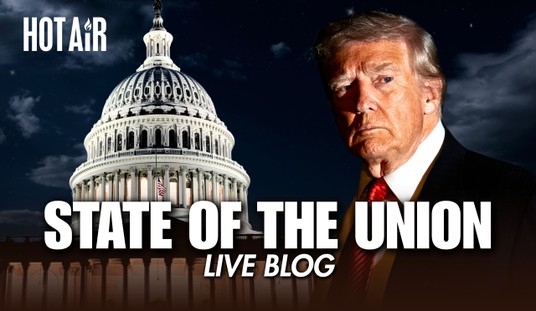It’s Election Day in parts of Ukraine — but only because Russia imposed it. Vladimir Putin ordered referenda on annexation held in the parts of the Donbas that Russia still controls — and some areas it no longer does — in order to justify the seizure of those areas. That seizure will allow Putin to claim that any further Ukrainian advances in those areas are an invasion of Russia, which will unlock his ability to order full mobilization … and potentially other options.
We’ll get to the full-mobilization issue in a moment, but let’s stick to the referenda first. Ukrainian authorities are pleading with those behind enemy lines to refuse to vote and expose the process as the sham it is. Cooperation, warned the mayor of Melitopol, is collaboration:
The Ukrainian-elected mayor of the city of Melitopol is urging those in Russian-occupied areas of the country not to partake in the so-called “referendums” being held by Russian authorities.
“We call on the residents of the occupied territories not to participate in the pseudo-referendum in any way,” Ivan Fedorov wrote via Telegram.
“Participation in it is to support the bloody plan to escalate the war against Ukraine, to voluntarily become part of a closed totalitarian society, to assume part of the responsibility for war crimes, to agree to the mobilization of men aged 16-55 to replenish the cannon fodder of the Russian Army, to commit a criminal offense.”
“Don’t open the door to agitators. Do not go to the polling stations. Completely ignore the entire election process. Stay as far as possible from Russian military and enemy equipment. Our heroic armed forces of Ukraine will definitely liberate all occupied territories from racism,” Federov said, adding, “most importantly, participation in a pseudo-referendum is the worst betrayal.”
On the other hand, Ukrainians trapped in Russian occupation may not have much choice in the matter. Good Morning America reports that Russian armed forces plan to go door-to-door and force residents to vote at gunpoint. That certainly blurs the line between collaboration and duress, but it also makes an even bigger mockery of the referenda results on the same basis. “Vote da or we kill you” is one hell of a campaign slogan, after all:
BREAKING NEWS: There is panic in Russia after Vladimir Putin orders new mobilization. ABC News' @TSoufiBurridge has more from Kharkiv, Ukraine. https://t.co/eoKvQ4n65a pic.twitter.com/EpNPLXwfXz
— Good Morning America (@GMA) September 23, 2022
Not that anyone outside of Russia and their stooges in the Donbas takes this seriously as a matter of law anyway. UN Secretary-General António Guterres called it a “violation of the UN Charter and international law.” The US and the EU nations have rejected it, as has Ukraine itself:
U.S. Ambassador to Ukraine Bridget Brink referred to the referendums, as well as increased military mobilization, as “signs of weakness, of Russian failure,” echoing many opinions that Russia is acting out under pressure in response to Ukrainian advances.
“The United States will never recognize Russia’s claim to purportedly annexed Ukrainian territory, and we will continue to stand with Ukraine for as long as it takes,” Brink tweeted Tuesday. …
“There is global consensus and international law,” Mykhailo Podolyak, the adviser to the head of the office of the president posted on Twitter. “It is unambiguous: Donetsk, Luhansk and Crimea are Ukraine. Any attempts to repaint flags are a fiction that will not change anything for us nor for our partners.”
The Ukrainian Ministry of Foreign Affairs said in a statement that any referendum in Russian-occupied territories will not have any legal consequences.
“No matter how much the Russian Federation holds illegal votes in the temporarily occupied territories of Ukraine, the result will be the same: all Ukrainian territories will be freed from Russian occupation, and the Russian leadership will be brought to the strictest responsibility for organized terror, war crimes and crimes against humanity on Ukrainian soil,” the statement said.
None of that matters to Putin, who isn’t seeking international recognition in the first place. He’s looking for an excuse to justify a wider mobilization and more spending on this lost cause in a desperate attempt to salvage some gain from what is right now looking like a total loss. He has to get his populace fired up for the fight, and the only way to do that now is to paint the heretofore tiny “Nazi clique” into a force that could do what Napoleon and Hitler could not — conquer Russia proper.
It’s not working, as the video above from GMA and this one from the Daily Mail shows. Russians do not want to go to the Ukrainian front, and Russian forces are impressing anti-war protesters into service instead:
The referenda could create another foreign-relations headache for Putin other than in the West, however. China has already cooled on its “friendship” with Russia over the brutality and failures in Ukraine, as has India. Both of those countries have active disputes over claimed territories over which they claim sovereignty: Taiwan for China, Kashmir for India. Cheering on referenda to determine national sovereignty could backfire for both nations, which might explain the very chilly reception Putin got from Narendra Modi and Xi Jinping earlier this month.
Even with that aside, the domestic gambit clearly isn’t working. ISW focused on that aspect in its daily briefing last night:
The Kremlin’s heavy-handed approach to partial mobilization may successfully meet the Kremlin’s internal quota of mobilized personnel but is unlikely to generate effective soldiers and is prompting significant domestic backlash for little gain. Russian authorities are forcibly recruiting Russian citizens to fight in Ukraine on flimsy pretexts, violating the Kremlin’s promise to recruit only those with military experience. Russian authorities are also demonstrably mobilizing personnel (such as protesters) who will enter the war in Ukraine with abysmal morale. The Kremlin’s heavy-handed approach to partial mobilization will likely exacerbate domestic resentment of a measure that would have been unpopular even if implemented without the harsh approaches observed in the last 24 hours.
The Kremlin is openly not adhering to its promised conditions for partial mobilization just 24 hours after its September 21 declaration. Russian officials previously claimed that partial mobilization will only impact 300,000 men and only those with previous military experience.[1] Kremlin Spokesperson Dmitry Peskov stated on September 22 that the practice of administering mobilization notices to detained protesters does not contradict the September 21 mobilization law. Peskov’s threat contravenes the Kremlin’s claim that it will abstain from mobilizing men outside of composed reservist lists.
They also raise the possibility that the mobilization served as a distraction for a prisoner swap that milbloggers opposed:
The Kremlin likely attempted to downplay a prisoner swap with Ukraine that is deeply unpopular among Russian nationalists and milbloggers by undertaking the swap the same day Putin announced partial mobilization. The Kremlin exchanged 215 Ukrainian prisoners of war (POWs), including captured foreign nationals and Azov Battalion leaders, for at least 55 Russian POWs and political prisoners, including Putin’s personal friend, Ukrainian billionaire Viktor Medvechuk, on September 21.[14] The Russian Ministry of Defense claimed on September 22 that Russian and DNR and LNR POWs were in “mortal danger” in Ukrainian custody.[15] Far-right Russian milbloggers criticized the exchange and asked if the Kremlin had given up on the ”de-Nazification” of Ukraine, one of the stated goals of the Russian invasion.[16] Kremlin propagandists had heavily publicized the capture and planned prosecution of Azov personnel, accusing them of being Ukrainian Nazis. Other milbloggers criticized the Kremlin for enabling what they called Ukrainian information operations and ”allowing Kyiv to manipulate the mood in Russia.”[17] Chechen leader Ramzan Kadyrov described the exchange as ”incomprehensible,” implied that Chechen forces tortured Azov prisoners in captivity, and implied that Russian forces who capture ”Nazis” should kill them rather than take them as POWs if they will be traded back to Ukraine.[18] Torturing or killing POWs is a war crime and violates the Geneva Conventions.
Peachy.
All of this does help us to appreciate our own elections and our ability to engage in a political system in which self-governance remains the rule rather than the exception. It’s not perfect, but it’s light-years away from what others experience … especially in the Donbas these days.









Join the conversation as a VIP Member